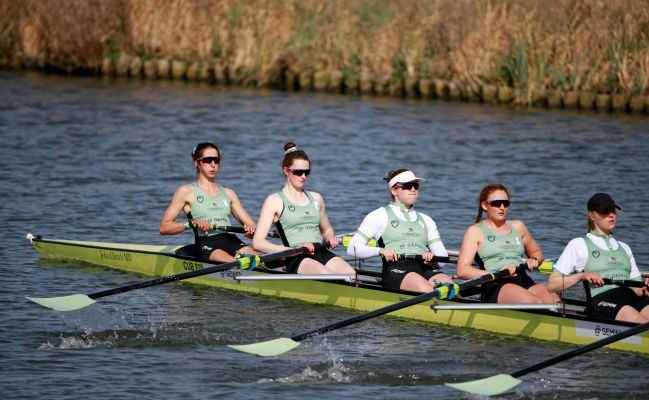On June 10, 1829, Oxford defeated Cambridge in a regatta held at Henley-on-Thames.. That day one of the oldest events was born of history of sport which became an annual in 1856. Only world wars and the coronavirus canceled editions. On Sunday (3:23 p.m. in Spain for women; and 4:23 p.m. for men) the two coxed eights from each category return to their usual stage in London to travel, against the current, the 6,779 meters from Putney to Mortlake of the 167th men’s edition (85-80 for Cambridge plus a tie in 1877) and 76th women’s (45-30 also dominates Cambridge). English tradition with a Spanish protagonist: Adriana Perez Rotondo. The 26-year-old from Madrid, the bow of the Cambridge boat, already knows what it means to win the regatta. She did it last year, for less than a boatlength, on the Great Ouse and without an audience. Cambridge’s fourth consecutive victory. In 2022 she wants to repeat. “It is exciting to return to the essence and it will be special with thousands of spectators present (an attendance of 250,000 people is estimated),” the Spanish assures AS.
The Cambridge boat (Andrea, second from left).
The boat race
“The preparation is going very well, with nerves but very excited. We have been training for a week in the part of the river where the race takes place. It is a special water due to the type of currents and we are adjusting details to get the most out of it,” reveals Adriana whose story is surprising. She is the daughter of scientists and a student at the French Lyceum. She was awarded a scholarship and graduated in three years in mathematics and physics at Columbia University. She decided to do a postgraduate master’s degree and her best options were Oxford and Cambridge. They both accepted her request, she chose Cambridge… and there she began to row. “Rowing is very popular and every college in the university, 20-somethings (his is Newnham), has their team. So when you get there it’s normal to try even if you’ve never touched a boat. And that’s what I did. I liked it a lot, I was given fine and I stayed” Explain. After finishing his master’s degree he wanted to do a doctorate… and broke into Oxford again. He offered her the James Buckee scholarship, the most comprehensive in the physics department, reserved for two students per course. But she Adriana was loyal to Cambridge.
“It’s my last Oxford-Cambridge and I want to say goodbye with another victory”
Adriana Perez Rotondo
“Anyone was a great opportunity. I had an offer from Oxford but decided to stay here for academic reasons. And it had something to do with seeing people row as well. It would have been difficult to make the transition, now I can’t imagine rowing with Oxford. I don’t know.” say no to Cambridge (laughs),” he says modestly before explaining: “I am in the engineering department and I am doing a doctorate in computational neuroscience, which is making models of the brain with mathematical, physical, computational simulations… to better understand how the network of neurons works and how the brain processes information and thoughts. To be part of the rowing team you must be a student and I am in my final year; It’s my last Oxford-Cambridge and I want to say goodbye with another win.
Wonderful and didactic mind, he explains how the gear of his boat works. “There are people from different programs and levels. We have three Olympians, two are from New Zealand and one won two medals in Tokyo. I am in the bow, which is where the lighter athletes usually sit. This trim is very important in this type of murky water because you have to be very gentle to keep the boat balanced. The bow is more technical and in the middle of the boat the strongest and most powerful are placed. It’s the engine and then in the stern are the ones that set the pace. That is the theory, then everyone must set the pace, be powerful and have technique and balance so that the boat can win”. And he adds laughing: “One good thing about my seat is that if you win you’re the first to cross the finish line.”
“Everything is done out of pride and honor, there is no financial compensation, not even a medal.”
Adriana Perez Rotondo
Showdown on the Thames… and outside? This is how she explains it: “There is an enormous sporting and academic rivalry. And although there is great respect, we do have the impression that they are less interested in talking to us… They have been losing for years and they will see it from a different perspective.” Finally, Adriana reveals that the prizes are sentimental: “Everything is done out of pride and honor, there is no financial compensation or even a medal. We touch the trophy for five minutes and then it goes in a box. What you can take is a bottle of English champagne (laughs). It is a great recognition in the world of rowing to participate in the regatta. In addition, it does not depend only on your sports skills but you must be in a university of this prestige and be able to maintain the level while you study, work eight hours in the laboratory and prepare for the sport”.
The Cambridge boat, training these days in London.
Cambridge University
